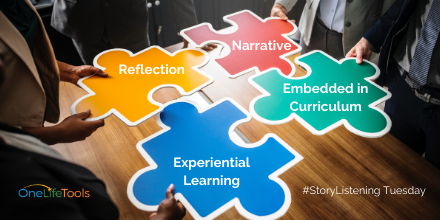Sometimes we go out in the world and we can see, clear as day, that what we do, can help.
It's a puzzle piece falling into place. An answer.
Our co-founder Mark Franklin shared with me what he learned at the recent Experiential Learning Symposium in Toronto. First, that EL exists in many forms on today’s campus: work-integrated learning like co-op and internships, learning embedded in curriculum like field and group work, and learning gained from extra-curricular activities like volunteering and athletics.
Second, there is a movement towards increasing the quality of Experiential Learning so that as it expands to meet every student, on every campus. It’s worth it. It’s measurable.
Employers can get behind it - demand it even - as a standard for preparing youth for the world of work. Students engage in it and value it as a key part of their education. Funders and stakeholders champion it as a non-negotiable norm.
Third, a key part of assuring the quality of Experiential Learning is reflection.
Without a systematic, scalable and engaging process in place for students to reflect on their time spent in EL, what’s the point?
Students need to reflect to integrate all forms of learning, including experiential and academic. They need to reflect to clarify skills, qualities and influences they got out of it, to assess the quality of that learning, and to give feedback to employers. This next one is vital: students need to reflect to find clues that lead to taking inspired action in their careers and lives, once they graduate.
We have that systemic, scalable process already, in our Online Storyteller software and in our narrative method of practice. We help people capture the gems and insights that come up as they reflect, through a holistic, narrative framework, on their experiences.
At OneLifeTools, as we visit more conferences and campuses, we are discovering a duty that we have. We have to connect the dots between our post-modern approach to career development and the post-modern world out there.
We have to show how our piece of the puzzle supports completing the whole.
That's why we are starting these conversations here, on #StoryListening Tuesday, on the blog, in coffee shops and conference plenaries - wherever people are looking for answers.
Let's chat - do you agree that reflection is a key component of assuring quality in Experiential Learning on campus? Leave your comments below, connect with us on social or email us.
For further reading, please see this slide deck from the symposium’s plenary Moving Forward on Experiential Learning: Tracking, Measuring, and Scaling Up, this report from Council of Ontario Universities and visit the CEWIL website here.
To learn more about what we do, you can join one of our free, live webinars by clicking here.


Leave a comment: